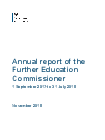Further Education Commissioner: Annual report 2017 to 2018

Report on the activity of the Further Education Commissioner.
This year has seen some significant achievements in strengthening the FE sector. It has also highlighted the challenges that remain to be addressed. Due to the expansion of the FE Commissioner role, we have been able to support more colleges earlier, and often support those colleges to tackle issues before they become too serious.
In some cases, colleges have asked us to visit, understanding that Diagnostic Assessments can be a tool for college governors and leaders to assist them in planning for the future, and not just a sanction against colleges facing challenges.
The introduction of Diagnostic Assessments have meant that we have been able to visit 29 colleges during the reporting period, in 15 of which we have strengthened improvement plans, and in 3 cases we have put the college into Formal Intervention.
In these cases we have been able to get a head start on recommending action, which was not an option before the creation of the diagnostic assessment process, when it may have taken longer to act and problems may have worsened.
We have continued to formally intervene in colleges where that is the appropriate course of action and have worked with college leadership teams and governing bodies to turn them around. With 8 colleges going into Formal Intervention, compared to 20 last year, progress is being achieved – fewer colleges are receiving inadequate Ofsted grades, and problems are being tackled earlier, including through structural change. While each college my team and I visit is different, and the reasons that they need support may vary, there are clear actions that all colleges can take to put themselves on a solid footing.
Colleges need to ensure they have a costed curriculum plan, setting out margins by course, and boards need clear and accurate management information to support this. The board should have a clear focus on teaching, learning and assessment, and have a clear mission that the organisation understands, which provides context for all board decisions.
Furthermore, college boards need to be realistic, particularly about forecasted revenue, and have the right expertise to do this; and governors need to have the strength and expertise to challenge robustly.
We have seen further progress in strengthening the long-term position of colleges through structural change, with 17 college mergers going ahead this year. At this stage in the process, the remaining mergers are more challenging, and it is testament to the hard work and commitment of college leadership teams, my team of deputies and advisers, and the Education and Skills Funding Agency (ESFA), that these are being achieved.
My team have also led 12 Structure and Prospects Appraisals (SPAs) in the year, which shows that some colleges that were forecasting financial stability have needed to change their view. Given that the Restructuring Fund is no longer available, it is even more important now that colleges are putting in place robust forecasts, and taking action if they think they may be in financial risk.
Since last year the FE Commissioner role has had a wider remit to both support colleges more broadly in improving quality, and to ensure that the practitioner perspective is fed into the policy process, ensuring more effective implementation.
The appointment of National Leaders of Further Education (NLFEs), and the creation of the Strategic College Improvement Fund (SCIF) have enabled us to support colleges in accelerating quality improvement. The NLFEs were appointed following a competitive application process, and have an impressive record of improving performance.
Through the SCIF a much broader range of colleges have come forward in addition to the NLFEs to support other institutions in improving. This is really commendable, and early feedback indicates that a lot has been achieved.
I would like to pay tribute to all the colleges that have contributed to the progress that is being made. Sharing good practice is one of the sector’s most powerful improvement tools. The Principals’ Reference Group (PRG), created as a set of outstanding college leaders used by the Department for Education to feed into policy is having a significant impact.
This group has fed into a wide range of departmental thinking – examples include T Level development, preparation for the Spending Review, and support for workforce development. The Minister for Apprenticeships and Skills takes a keen interest in the PRG, and it is highly valued by senior officials.
While it is not a substitute for broader consultation with the sector and representative bodies, it is extremely valuable that detailed practitioner input can be provided at an early stage of thinking. FE colleges face another year of real challenge.
Apprenticeships reform and T Levels implementation mean that colleges will need to keep adapting. In addition, the start of the insolvency regime, and the end of the Restructuring Fund and Exceptional Financial Support mean that there are real risks to colleges and the communities they serve, if a college is failing. Therefore, it has never been more important to plan ahead, and create robust and realistic forecasts of future revenue.
If colleges feel they need support, they should not hesitate to contact me.
Richard Atkins CBE, FE Commissioner
Documents

Further Education Commissioner: annual report 2017 to 2018
Ref: DFE-00330-2018PDF, 1.38MB, 12 pages
Details
The Further Education Commissioner reports on:
- his activity between 1 September 2017 and 31 July 2018
- the state of the further education college sector












Responses